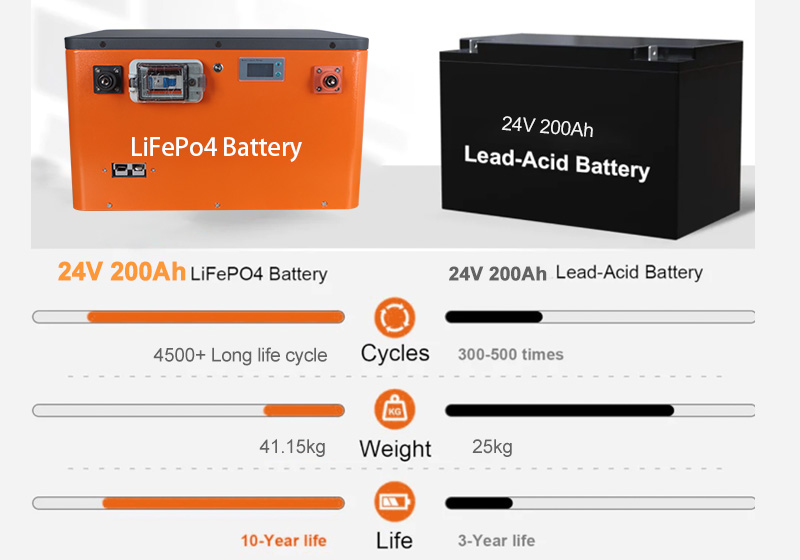Email format error
Email cannot be empty
Email already exists
6-20 characters(letters plus numbers only)
The password is inconsistent
Email format error
Email cannot be empty
Email does not exist
6-20 characters(letters plus numbers only)
The password is inconsistent

Newsweek
Grasp current events and learn more about batteries

Battle of Power: Lithium Iron Phosphate vs. Lead-Acid Batteries - Who Will Lead the Future of Energy(1)
Lithium Iron Phosphate vs. Lead-Acid Batteries: Powerhouses in the Energy World
In the era of modern technological advancements, batteries play an indispensable role as the core components for energy storage and power supply. Whether it's electric vehicles, renewable energy systems, portable electronic devices, or emergency backup power, batteries are the driving force behind these applications. This article focuses on the heavyweight contenders in the energy world – Lithium Iron Phosphate (LiFePO4) batteries and lead-acid batteries. We will delve into their technical characteristics, application domains, and respective strengths and weaknesses.
I. The Significance of Batteries in Modern Life
With the advent of the digital age, the importance of batteries has become increasingly prominent. Batteries serve as the soul of portable electronic devices, providing sustained power for smartphones, tablets, laptops, and more. Simultaneously, the application scope of batteries has expanded into the transportation sector, with electric vehicles and e-bikes driving the demand for batteries as the core of new energy transportation. Additionally, as renewable energy becomes more widespread, batteries play a crucial role in energy storage systems, contributing to the development of clean energy.
II. Lithium Iron Phosphate: The Trailblazer
-
Technical Features: Lithium Iron Phosphate batteries, a type of lithium-ion battery, have gained significant attention due to their outstanding performance. Firstly, they boast high energy density and specific energy, providing more electrical energy while remaining relatively lightweight. Secondly, LiFePO4 batteries exhibit a longer cycle life, enduring more charge-discharge cycles without performance degradation. Moreover, they charge quickly and can undergo deep discharges without damage.
-
Application Domains: LiFePO4 batteries find widespread applications in electric vehicles, e-bikes, energy storage systems, and portable electronic devices. Their high energy density and long cycle life make them the preferred power source for electric vehicles, offering users extended driving ranges and prolonged battery life.
-
Advantages: The advantages of LiFePO4 batteries lie in their high energy density, long cycle life, fast charging capabilities, and tolerance to deep discharges. These features make them excel in various fields, positioning them as crucial supporters of clean energy and electric transportation.
III. Lead-Acid Batteries: The Essence of Tradition
-
Technical Features: Lead-acid batteries, a traditional type of rechargeable battery, stand out for their relatively low manufacturing costs. While they exhibit lower energy density, the manufacturing and maintenance costs of lead-acid batteries are comparatively lower, making them suitable for cost-sensitive applications.
-
Application Domains: Lead-acid batteries are primarily used in emergency backup power systems, as starter batteries for electric vehicles, and in some short to medium-power applications. Their low cost ensures that lead-acid batteries still have a place in specific fields, especially where lower battery performance requirements exist.
-
Disadvantages: The drawbacks of lead-acid batteries mainly manifest in their relatively lower energy density and shorter cycle life. In applications requiring high energy density, long cycle life, and lightweight solutions, lead-acid batteries are gradually being replaced by more advanced battery technologies.

IV. Future Prospects and Development Trends
LiFePO4 batteries and lead-acid batteries each have unique advantages and application domains. With continuous technological advancements, the demands for battery performance, cost-effectiveness, and environmental friendliness are on the rise. In the future, LiFePO4 batteries are expected to play a more significant role in areas such as clean energy and electric transportation, while lead-acid batteries may still play an important role in specific scenarios.
In conclusion, as a crucial energy storage solution in modern life and industrial production, the development of batteries will have profound impacts on society, the economy, and the environment. By gaining a deep understanding of LiFePO4 batteries and lead-acid batteries, we can better choose and apply energy solutions suitable for different scenarios, driving sustainable development in the energy sector.

